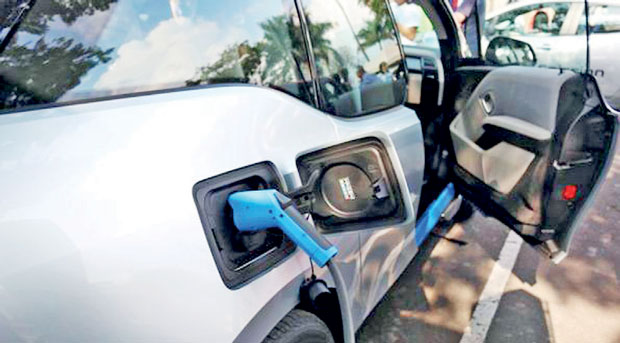01 Sep 2017 - {{hitsCtrl.values.hits}}

 A defining question for many countries today is how to deliver the smartest transition possible to a clean energy economy. While no formula exists, one thing is clear: countries will benefit from thinking big from the start.
A defining question for many countries today is how to deliver the smartest transition possible to a clean energy economy. While no formula exists, one thing is clear: countries will benefit from thinking big from the start.
Embracing a big vision does not mean a country must change everything at once. It rather encourages having a clear direction from the beginning.
In Costa Rica, our power generation is nearly 100 percent renewable. We rely on hydro, wind and geothermal sources. Clean energy gets to 99 percent of the population, but we are still working on more solar and biomass, as well as on fully decentralizing our electricity system.
Many countries can follow our path, but not necessarily the same way or at the same pace. This applies for instance to countries in Central Asia, as I discussed during a recent clean energy forum co-organised by the Asian Development Bank in Astana, Kazakhstan.
Central Asian countries are gaining a new clarity around the benefits of energy diversification through renewables. At the forum I had the chance to talk to colleagues from Kazakhstan, Afghanistan and Azerbaijan, who are committed to advancing solar energy projects. In Astana, we visited a solar panel plant and discussed the promise of this technology over the next decade.
Costa Rica’s experience with clean energy is relevant to Central Asia—and elsewhere—because it shows how making “big bets” pays off.
Following the introduction of social guarantees and the abolition of the army in the 1940s, our country increased investments in hydro in the 1950s and in national parks in the 1970s. The 1990s brought innovative payments for ecosystem services as well as eco-tourism strategies and a moratorium on oil exploration and exploitation activities was put in place in the 2000s.
In 2015, as governments were negotiating the Paris Agreement on climate change and the appetite for renewables went global, the world discovered Costa Rica.
I remember an interview with the TIME magazine during which the journalist seemed fascinated with a country that could run 75 days without any fossil fuels. By the end of that year, the sum had increased to 299 days and Costa Rica was making global headlines.
Costa Rica’s strategy has clearly paid off in terms of country branding. Our tourism has benefited from being celebrated in the global media for our clean energy achievements and being ‘green’ has entered our national narrative.
Zero-emissions electric mobility
What comes next is getting rid of fossil fuels for transportation. The time has come, because technology is on our side, to confront our high oil dependence by leapfrogging to electric cars.
Rather than focusing on “cleaner fossil fuels”, Costa Rica wants to achieve zero-emissions electric mobility. This means big investments in electric public and private vehicles and transit systems.
The Dieselgate scandal confirmed the fallacy of “clean fossil fuel” solutions. Cheating had become too easy, even in the world’s most regulated markets like the EU, where citizens have paid a big price because air quality has deteriorated in part due to the misconception that diesel could help reduce pollution in cities.
Going forward, developing countries like those in Central Asia will need to avoid getting too caught up in the pursuit of cleaner fuels for more efficient cars. Instead, the big bet should be on electric mobility. More autonomy for cars, innovative charging infrastructure and cheaper batteries will make these technologies become mainstream faster than we imagine.
Many countries and cities throughout Asia, Africa and Latin America are considering electrifying transport. As citizens confront the reality of unsustainable urbanization, air pollution and impossible congestion, the case for zero-emission, public electric transport will gain wider support.
Discard clean fossil fuels, embrace electric mobility
Costa Rica’s power utility plans to buy 100 electric vehicles in a pilot programme that will be the largest institutional purchase of such products in Latin America. New and second-hand electric cars are increasingly available on the market and the charging infrastructure is under construction.
The government is showing citizens that the technology is ready and superior to oil-based transportation because it is cleaner and quieter. A law to wave taxes on electric transportation (cars, buses and e-bikes) will be voted on by parliament in the coming weeks.
Costa Rica Limpia has supported these efforts by helping explain the benefits electric mobility to citizens in a language they understand and bringing together pioneers that have already switched to electric cars. Plans for an electric train network have been approved and trials have been set for electric buses are underway.
Now is the time for countries to think big because much is at stake if we don´t achieve a much cleaner energy future. This is not about delivering a few solar projects here and a few electric cars there, while most investments continue go to traditional infrastructure for power generation and transportation.
We must go beyond a sole focus on efficient combustion engines and debate how to deliver electric mobility that runs on renewable electricity. The technologies exist – now we need to make them real and desirable for the people.
(Monica Araya is an advocate of electric mobility in Latin America)
06 Jan 2025 31 minute ago
06 Jan 2025 1 hours ago
06 Jan 2025 1 hours ago
06 Jan 2025 1 hours ago
06 Jan 2025 2 hours ago